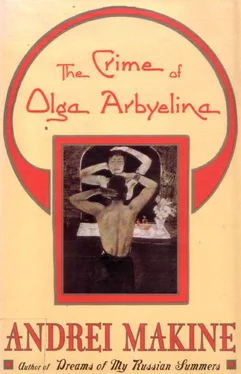In the morning when he came into the kitchen she noticed a discreet dressing on one of his fingers. "Have you cut your hand?" she asked him without thinking, as she would have done in the old days.
"No," he replied simply. "No…"
It took her some time to realize that after that morning their paths were crossing less and less often.
Several nights followed, calm nights, spent with her eyes open, only rarely punctuated with brief oblivious intervals of sleep. Her days, on the other hand, flew past in a state of distraught weariness, which was intruded on by the faces of the residents of the Caravanserai and the readers at the library. Eyes unbearable in their insistence; lips coming too close; words articulated with a slow, wet sucking sound that distracted her attention and left their meaning unclear. She would reel back and turn aside; then start talking to cover up her awkwardness. Her own voice deafened her, as if it were resonating somewhere behind her. And an obsessive thought, like a frayed thread being vainly thrust into the eye of a needle, revolved in her drowsy mind: "What if I made no more infusions in the evening? He would understand everything… No, I must continue but drink them in my room. No, I can't. He'll guess…"
The following evening she took the little saucepan into her bedroom. And a few minutes later, glancing through a half-open door, glimpsed a shadow flitting down the corridor and slipping into the kitchen. Or perhaps she just thought she glimpsed it? She was no longer entirely sure of what she saw. The next morning she did not find the little vessel on her bedside table. "So I didn't bring it," she noted, dulled by sleep; but then suddenly realized that the business with the cup went back to the night before, or even the night before that. In her memory the days overlapped, then disintegrated, revealing a glimpse of an opaque matter, without hours, without sounds.
And when one evening she again saw the fine white dust on the surface of the infusion, this did not seem like a repetition but rather the continuation of the action interrupted several days earlier, the night when the sparks from the firewood had burst out of the stove. And so, the icy fingers continued their pressure on her shoulder, on her hip. Her body tipped slowly onto her back… And her tiredness, her exhaustion were such that she did not have to feign sleep. For the moment she felt dead. In place of the confused thoughts, the feverish words that for weeks had echoed in her mind day and night, a heavy, regular sound took her over entirely-like the sound of the wind in the tall treetops in a forest in winter…
All at once this deathly calm was broken. Despite her closed eyes she saw, saw the room, the bed, their two bodies. Her fleeting death was at an end. A movement, a slight stiffening, she did not quite know what, must have betrayed her. She heard the rustling of footsteps, had time to glimpse a candle flame, a long flame spread out horizontally, sucked in by the darkness of the corridor.
It was this candle that allowed her to keep madness at bay. She would spend the morning explaining to herself in a quite measured way that on account of the power cuts everyone was reduced to using candles and that one must be wary of fires, especially in families with young children and that… She was afraid of deviating for a moment from the protective logic of these trivialities.
Over several days she would carry on her body the sensation of a supple and timid weight.
And then there would be a night when, without having drunk the infusion dusted with white crystals, she would fall asleep, no longer able to withstand the mountain of lost sleep weighing down her eyelids. She would fall asleep at the very moment when a candle flame appeared in the slow gliding of the door. And would wake a moment later, alone, in the dark. With a sick person's alertness she would smell the odor of the wick and the breath of cold, of ice, of night, that the long overcoat carried in its folds. And she would guess that the gaze that had just been resting on her had sensed the torment of her sleeping body and that his nocturnal visit had only lasted for a moment of brief, silent compassion.
THE day after that night she surprised herself in front of the mirror-a face tugged this way and that by grimaces and on her lips a long breathless whisper: "Tarantella, tarantella, tarantula, ta-ra, ta-ra, tarantas…" There was no possibility of stopping, for immediately other words, perfectly reasonable phrases, with all the infallible logic that often characterizes the arguments of the insane, began to hiss within her. Yes, the very same phrases whose good sense had seemed to be her salvation several days earlier. Now their intonation, obtuse and imperturbable, terrified her.
"He came bringing a candle. It's dangerous. What's dangerous? That he came… That coat. He puts it on so he can quickly cover his naked body if I wake suddenly. If I woke up he could say that the French door was open and he came to close it. No doubt he's already thought of all the possible answers… He has only touched my body, a woman's body that intrigues him. Yes, that's how it must be said. He has caressed a woman's body. If I could become that nameless woman. Better still faceless. An accident? A face covered in bandages, invisible. And the body asleep, not responsible… When all is said and done what has happened so far is harmless… I live in hope that it will remain harmless. So I accept it; I'm becoming used to it; I have nothing against what happens next, on condition that it does not go beyond a certain limit. What limit?"
She began reciting her "tarantula-tarantella," again, even more feverishly, her eyes half closed, her head animated by little quivers. At all costs she must not let the thought that was forming be born…
In response to this incoherent prayer there was a sudden knocking at the front door. No, in truth, the knocking had been audible for some time now and it was the noise of it that had sparked off the "tarantella-tarantula." For, hearing someone knocking, she had to stifle the inadmissible thought: "What if it were someone who… ta-ra, ta-ra… someone coming to… tarantella, tarantella… coming to say that… shut up… tarantella… tarantula… the child… shut up… tara, tara… that the child has… shut up… the face under the bandages… ta-ra, ta-ra… my face, mine, mine, mine… tarantella-ta-ra-ta… Certainly not he… and if it is he… months in hospital… no… no… You're hoping for an accident… Shut up… ta-ra, ta-ra…"
She opened the door. In the telegram the postman held out to her she read that someone was informing her of their return to Paris. Left alone, she did not immediately succeed in matching to this someone the initials "L.M." and told herself with stupefaction that to other people these letters signified "her friend" or "her lover."… She knew that after a long absence L.M. would send telegrams-a way of skipping a few stages in a reunion, limiting the period of reproaches, excuses, coldness, and forgiveness eventually granted. "Mountains of work. Will be in Paris Saturday," he wrote this time. Behind these words she heard a tone of voice that sought to forestall all objections.
"How strange it is," she thought. "So that's still going on. In their lives. Down there…"
She understood that from now on "down there" started outside her own front door.
She knew what was going to happen. He would leave the car beneath the row of plane trees near the station, make his way down into the lower town, taking little deserted streets, and would cheerfully proclaim to her that not a single resident of the Caravanserai had seen him. In the hall, after kissing her, he would run his fingers over the top of the chest of drawers, over that corner sawed off so many years ago. And he would inquire after the health of her son with a very labored air of involvement. They would go off to Paris. While driving he would talk a lot, but would fail to hide his slight lack of self-assurance, his nervousness-the awkward uncertainty of a man confronting the woman who has to accept the scraps of life that he grants her… He would talk more copiously still during part of the night, reassured by her affection, by the absence of reproaches, by the constancy of this woman's body which, after a long separation, would be faultlessly adept at resurrecting the delicate erotic memory of the slightest words and caresses… In the morning she would be the first to leave the hotel, citing one of her usual pretexts (a visit to a friend, shopping…), and he, while offering to take her back to Villiers-la-Forêt, would not manage to suppress a note of grateful relief in his voice…
Читать дальше












